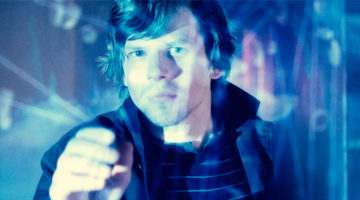Interview: Rudy Barichello talks Meetings with A Young Poet
“How can you not consider life absurd when you are born to die?” It’s a rhetorical question posited by Montreal filmmaker Rudy Barichello, but of course one playwright Samuel Beckett would have asked too.
The Canadian filmmaker recently co-wrote and directed a film about Beckett, bringing to light both the work on paper as well and the often unknown man behind the writings. Meetings with a Young Poet, which opened Friday, is simultaneously both an introduction for those unfamiliar with the late Beckett, as well as informative story for those in love with his work. It’s layered storytelling, romance, drama, and of course, a bit of dark, ponderous humour.
“People who don’t know anything about Beckett will see a fictional character and it works,” explained Barichello while in Toronto promoting the film. “If you know Beckett, you got the added pleasure and see all the references, but you start understanding also a little more about the fundamentals and then you’re discovering the man you may not have known even if you’re a Beckett expert.”
Barichello first read Beckett as a teenager and through the years began to consume more and more of his works, embracing the balance between life and dark and the stress of simply to do. You will fail, but you should strive to fail better, according to Beckett.
“He was dark, but not pessimistic,” Barichello explained. “I find him a poet of the ordinary, even though what you see is extraordinary, weird, devastating and odd. Yes it’s dark, but right here, it’s light.”
Fittingly, the seed of the film sprouted 12 years ago at a café in Paris, where Barichello and collaborator Marcel Beaulieu were cynically discussing what would be their next work not to get made. Both lovers of Beckett, and figuring a story about him would never be realized into a film, they started writing.
“Ultimately, it’s to do,” offered Barichello. “It is for me a statement of principal of how I think of my life, live my life, or aspire for my life to be. Beyond that, its’ also a film of emotion and of beauty.”
“I’m not inventing it, it’s a fiction, but that was the historic Beckett,” he continued, citing the a similarity between them in that they both think and speak in two languages (Beckett wrote in French and English). “It’s my Beckett; the film has become more a portrait of my writing through Beckett. It’s not a biopic, but all of the details that are biographic are factual.”
“The real mission of the film is to use Beckett as a lever to say, ‘be inspired and go out and create,’” added Barichell. “Creation is not an act limited to artists or scientists; nothing exists until you do it.”
Barichello, after talking about our society’s seeming desire to embrace stuff instead of coming together to embrace creation, challenged Canadians to support their own films, his or any others. “Go see the movies. This one or not, go see your own films. Canadian cinema is in a death spiral, and it’s a self-fulfilling prophesy.”
Beckett, however, will not be seeing Meetings with a Young Poet, but surely an imaginative filmmaker who has studied the playwright for decades might be able to figure out what his thoughts might be.
“He’s a generous soul,” began Barichello. “He would probably beat the s**t out of me for a lot of stuff that I say that he wouldn’t agree with, because he is quite brutal with his evaluation. But he couldn’t help but see he generousltiy and the love, not for him, but for the world, for humanity.”
“Ultimately, he would say to me, ‘don’t give a s**t what I think.’”


